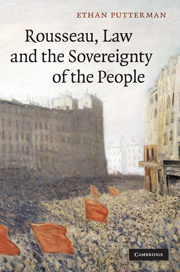Book contents
- Frontmatter
- Contents
- Acknowledgments
- A note on the text
- List of abbreviations
- Introduction: The celestial voice
- 1 Rousseau's concept of law
- 2 Agenda-setting and majority rule
- 3 Democracy and vote rigging
- 4 Popular sovereignty and the republican fear of large assemblies
- 5 Enforcing the laws in Poland and Corsica
- 6 Judging the laws/when legislation fails
- Conclusion: Law and liberty
- Select bibliography
- Name index
- Subject index
5 - Enforcing the laws in Poland and Corsica
Published online by Cambridge University Press: 04 August 2010
- Frontmatter
- Contents
- Acknowledgments
- A note on the text
- List of abbreviations
- Introduction: The celestial voice
- 1 Rousseau's concept of law
- 2 Agenda-setting and majority rule
- 3 Democracy and vote rigging
- 4 Popular sovereignty and the republican fear of large assemblies
- 5 Enforcing the laws in Poland and Corsica
- 6 Judging the laws/when legislation fails
- Conclusion: Law and liberty
- Select bibliography
- Name index
- Subject index
Summary
A frequently debated question in the scholarship on Rousseau's political theory centers on the intent behind his constitutional plans for Poland and Corsica. In the 1960s a number of distinguished commentators, such as Judith N. Shklar, William H. Blanchard and Jean Guéhenno concluded that Rousseau's utopianism in Considerations on the Government of Poland and his Project for Corsica was intentional and originated from, above all else, a desire for polemical social criticism above serious constitutional reform. Since this time more recent authors, such as Arthur M. Melzer, have articulately refined this thesis by arguing for the “realism” or non-utopianism of this type of social criticism, but very few authors today believe that Rousseau sought the actual constitutional reform of Poland or Corsica.
In an extended study Maurice Cranston writes, for example, that “the best [Rousseau] could suggest for Poles was to nurture a spirit of patriotism and modify their social and political system” but, at root, his advice “told the Poles as politely as possible that in view of their circumstances freedom was not an option for them.” Rousseau “used the Polish case as an occasion to indict all modern Europeans, who he said lacked the patriotic spirit and the institutions that had made possible the great political achievements of the ancient Greeks, Romans, and Israelites.”
- Type
- Chapter
- Information
- Rousseau, Law and the Sovereignty of the People , pp. 122 - 145Publisher: Cambridge University PressPrint publication year: 2010

